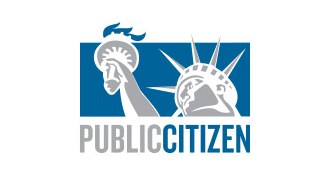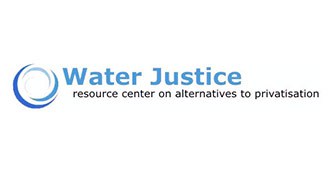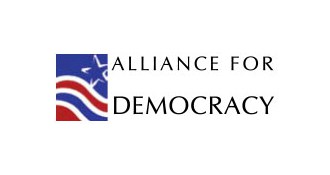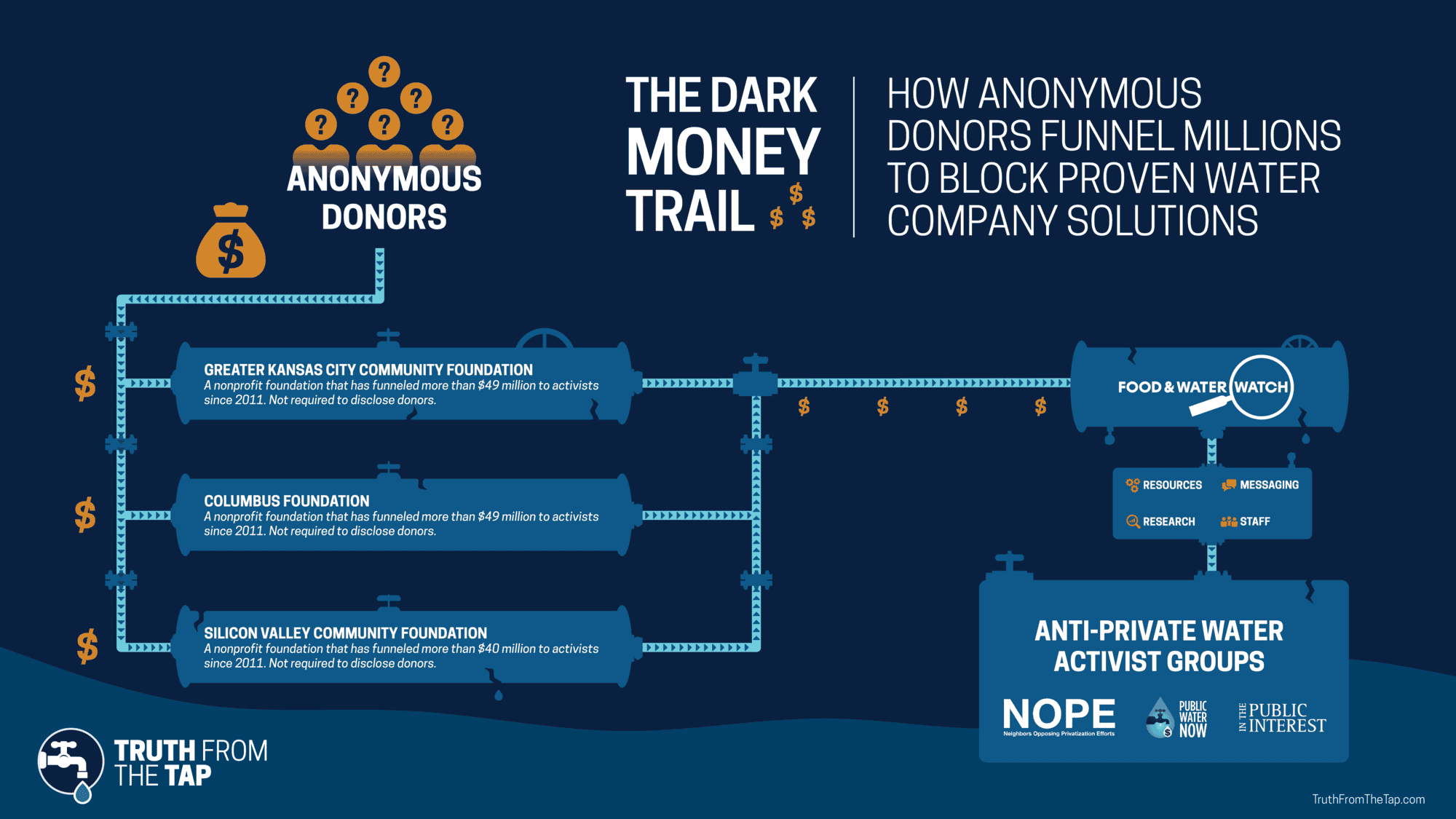About the Opposition
Opponents of water companies like to describe themselves as charities, consumer advocates, and water policy experts. In reality, these organizations are well-funded lobbying and advocacy groups without water service or water policy expertise. Unfortunately, these opponents are not focused on what’s best for a local community. They are blindly and ideologically opposed to any private sector involvement in water utilities, blocking communities from considering proven solutions offered by water companies.
Key Players
The web of anti-private water activist groups is hard to untangle as many of the groups share resources, research, messaging and even staff to block solutions offered by water professionals. Since 2011, Food & Water Watch has received more than $158 million in anonymous funding, raising questions about who is really controlling their agenda. Further, numerous community foundations are complicit, serving as the vehicle through which funding is anonymously funneled to activists. These ideological opposition groups oppose common sense, bipartisan solutions without offering realistic alternatives.
Click logos to learn more

Founded by Ralph Nader in 1971, Public Citizen is a Washington, D.C., based advocacy group that aims to increase corporate regulation and to influence federal government decision-makers. In 2005, Public Citizen spun off Food & Water Watch to focus on more specific issues, including a campaign to oppose solutions offered by water companies. 1

In the Public Interest tries to serve as an online resource to provide the public with “high-quality” and “accurate” information on issues pertaining to privatization and contracting. However, In the Public Interest takes an openly biased stance against water company solutions, often sharing Food & Water Watch research that is both misleading and unsupported. In the Public Interest provides visitors to their website with a skewed picture of water companies, something that is not at all “in the public interest.” 2

WaterJustice.org was created at the World Social Forum in 2004 – an international meeting of social groups opposed to globalization – to fight private water. Groups including Corporate Europe Observatory (CEO), the Council of Canadians and the Transnational Institute all played a major role in its creation. Water Justice has essentially created a forum for water activists to collaborate and share biased information and research on private water’s real track record. Content from Food & Water Watch is regularly featured on the site. 3

Described as a populist movement, Massachusetts-based Alliance for Democracy believes the American economy, government, culture, media, and environment are monopolized by corporate America. The Alliance for Democracy’s agenda is fueled by an Occupy Wall Street-style anti-corporate ideology that believes that all private markets are bad and that businesses cannot be trusted. 4

Food & Water Watch and other likeminded anti-privatization groups are funded by a network of foundation money and anonymous donations, making it nearly impossible to decipher whose interests are actually behind the group’s campaigns. In fact, since 2011, nearly 75 percent of FWW’s revenue – more than $158 million in total – came from anonymous sources.
5

In an effort to discredit water companies, Corporate Accountability often releases reports and collaborates with groups like Food & Water Watch and the research arms of global trade unions to make unsupported claims about water companies. Corporate Accountability researchers rarely cite sources or experts aside from themselves or likeminded groups, and their reports are full of inaccuracies and misleading claims.. Like Food & Water Watch, Corporate Accountability has also accepted millions in anonymous funding through foundations. 6

Public Services International Research Unit (PSIRU), funded by a global confederation of trade unions, was established in 1998 to focus on research to support anti-globalization and anti-privatization initiatives. PSIRU has collaborated with Food & Water Watch, Corporate Accountability International (CAI) and the Transnational Institute on recent research and publications opposing water companies. In one recent report released in collaboration with Corporate Accountability, the lead PSIRU researcher argued against water company solutions by citing his own work 115 times, seemingly finding very few independent studies or empirical evidence to support his ideological views. 7

Friends of Locally Owned Water (FLOW) tries to function as the face of local opposition against water privatization. Local FLOW groups take on responsibility for attacking potential and existing water arrangements in their areas through petitions and public opposition at city council meetings and in the news. While FLOW groups often position themselves as a grassroots movement, many of these “local” groups are closely linked to Food & Water Watch, often teaming up to create research reports and coordinate on efforts opposing water company proposals.8

Food & Water Watch and other likeminded anti-privatization groups are funded by a network of foundation money and anonymous donations, making it nearly impossible to decipher whose interests are actually behind the groups’ campaigns. In fact, since 2011, nearly 75 percent of FWW’s revenue – more than $142 million in total – came from anonymous sources. 9
Sources:
- “About Us,” Citizen.org website; Biography of Ralph Nader, Nader.org; “About Us,” Food & Water Watch website
- “About Us,” In the Public Interest website; “Water and Sewer,” In the Public Interest website
- About the website,” WaterJustice.org website
- “About AfD,” The Alliance for Democracy website
- Foundation Directory Online (FDO) accessed June 2024; FWW IRS 990s, 2011-2023; Foundation Grantee Lists, 2011-2023; Grants verified and cross-referenced against foundation IRS 990 filings.
- “About Us,” Corporate Accountability website; “Public Water Works!” Corporate Accountability website; “New Report Highlights the Case for Public Water,” Public Water Works! Blog, Nov. 2014; Foundation Directory Online (FDO) accessed June 2024; Corporate Accountability IRS 990s, 2011-2022; SVCF Grantee Lists; Tides Foundation Grantee Lists; Grants were verified by IRS 990s of Silicon Valley Community Foundation, Columbus Foundation, Greater Kansas City Community Foundation, the Chicago Community Trust, the Tides Foundation, and the Vanguard Charitable Endowment.
- “About Us,” Public Services International Research Unit website; Emanuele Lobina, “Troubled Waters: Misleading industry PR and the case for public water,” Public Services International Research Unit, Nov. 2014.
- “Felton Water System,” In the Public Interest website
- Foundation Directory Online (FDO) accessed August 2025; FWW IRS 990s, 2011-2024; Foundation Grantee Lists, 2011-2024; Grants verified and cross-referenced against foundation IRS 990 filings.










